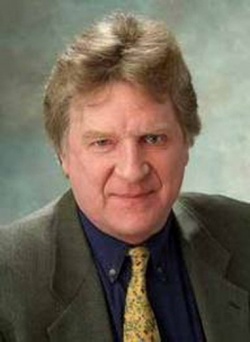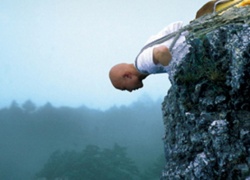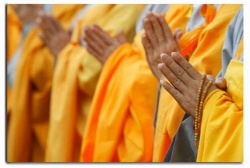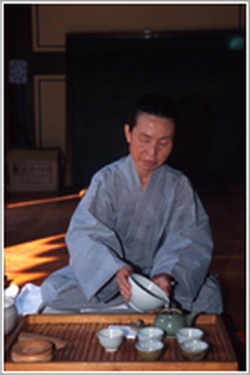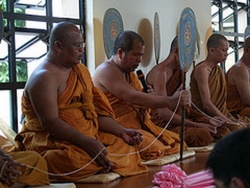Buddhism As Education: A Conversation with Robert Thurman
Chairman of Columbia University’s Religion Department Professor Robert Thurman hosted the conference cosponsored by the Center in 1994 called “The United Nations and the World’s Religions: Prospects for a Global Ethic.” He also served as a commentator on Center founder Daisaku Ikeda’s lecture, “Peace and Human Security: A Buddhist Perspective for the Twenty-first Century,” delivered at the East-West Center in Honolulu on January 26, 1995. At that time, Professor Thurman met with the Center’s staff to share these views on education, human freedom, and UN reform. Following is an abbreviated version of our interview with him.
How do you view the role of education in society, and what influenced your thinking on the subject?
RT: I think the question should rather be, What is the role of society in education? Because in my view education is the purpose of human life. It’s not that the purpose of education is to fit out humans to go and produce something. The essence of the human being is that it is a form of life that has the opportunity to evolve to a new state of being — a non-egotistical, enlightened state of being.
This is why Buddhism invented the institution of monasticism. Because the monastic lifestyle is the least cumbersome for an individual. You have one pair of clothes; you don’t have to have possessions; you don’t have children. So it draws the least amount of support from the collective and it gives the person who adopts it the maximal amount of time to devote to their own evolution. When you establish monasticism within a collective society, it creates the institutional permission for those individuals to be excused from normal productive duties, which is revolutionary in those societies. Most Buddhist monasteries traditionally functioned as universities, and the whole objective of meditating and Buddhist practice really is to transform the individual, and is thus part of the process of educating.
If you look at the history of Buddhism and Christianity, which is the other major monastic religion in world history, you’ll see that the big competitor for education in this personal transformative sense that I’m talking about is always militarism. The state will use militarism to shut down on this sort of educational process and turn it into an indoctrinational process where they produce units that will mindlessly obey orders and slaughter their neighbor units, or have a military state like the shogunate in Japan, or the American militaristic state of today.
The human individual is a precious asset, and the major function of a society should be to cultivate that asset. But militarism is the antithesis of that worldview, so you have armies, prisons, and minimal schools for such a society, and a lot of indoctrination.
How would these ideas translate into university-level education?
"The Western concept of liberal education itself originates in monastic institutions." I think the Western concept of liberal education itself originates in monastic institutions. Oxford University, the University of Paris, the University of Bologna — all these places were originally monasteries. The idea of liberal education was that the leadership elite has to have the ability to think clearly to make good judgments, and so they should be allowed a period in their lives where they seek to understand the nature of life, or engage in a quest. That’s a great point in which to fit this Buddhist idea of developing the powers of the individual human to their fullest as being the purpose of life. In a way humanist professors are those who have chosen to spend their lives doing that because they know that by teaching in such an arena, they themselves are constantly learning.
An understanding of this concept of lifelong learning fosters a new estimation of the value of a university system and of education. We note that a totalitarian system anywhere first shoots all the intellectuals. Then they develop their own cadre of intellectuals who just mouth their line of indoctrination, and free thinking is discouraged. An understanding of the preciousness of learning would encourage the ability to challenge the bosses and the authorities, the merchant classes and so forth. It would also translate in government terms into support of education at every level.
Today and for the past twenty years the frightened elite has been busily trying to block education for the people, putting forth quite racist ideas. This denial of the power of education to the people, on top of being immoral, is incredibly foolish, because when they won’t educate large segments of the population who they don’t want to learn and think for themselves, they end up building an immensely expensive prison system, and then comes the destructive violence and people lose their lives.
But the corporate people at our universities fail to realize that every aspect of their life, of anything they ever enjoyed, probably had to do with something they learned in school. That is, some opening of their sensitivity that occurred by their thinking about the meaning of things, about what is beauty, learning to see better, and so forth. When my mother died, I found letters she wrote as a college student to her parents that illustrate this process. It was such a moving experience to read these letters and see how her mind was opened and her life shaped by her college years.
Would you elaborate on how this notion of education for liberation of one’s potential is a radical idea?
Because of the nature of the economy and the way things were produced in ancient times, people inherit traditional ideas that you’re there to serve your parents and they’re there to serve their ancestors, and then you eventually get to be an ancestor yourself. Humans are part of this kind of natural cycle according to most traditional worldviews. So the notion of release, liberation, nirvana, which Buddha discovered, is something very revolutionary and radical in traditional human communities.
"Materialist and theistic worldviews deny there is such a thing as a blissful, boundless being." Many people think that freedom means the right to vote or not being under totalitarianism — that it’s a political thing. The idea that freedom means the ability to control your life and death so that you are kind of a boundless, blissful being — really cosmic, biological freedom — that there is such a thing even, is highly questionable from the point of view from most worldviews. The materialist worldview and theistic worldviews think there’s no such thing. Even many Buddhists today don’t quite imagine what it would be. Which is why the third Noble Truth is the most important Noble Truth in Buddhist teaching — the truth of freedom.
On the other hand, in the more so-called economically developed world there is the means if it were so devoted to allow a higher percentage of people to be educated. So it would be possible now to have more people really think about this issue of freedom, and monasticism may not even be so necessary in the modern sense.
But then sadly, in this time of abundance and potential minimization of economic servitude by masses of people, you have this nasty militarism dominating everything. That’s why I admire President Ikeda when I read his peace proposals, his appeals to the UN over the years to just can it, and disarm everything, and cut the baloney.
Would you elaborate on your idea that people can’t develop global human solidarity because they’re not fully educated in each other’s cultural traditions?
That was Edwin Reischauer’s thesis in his wonderful book called Toward the Twenty-first Century: Education in a Changing World. That in a globally pluralistic society, with the power of weapons and the closeness of communication between nations and people, it is dangerous for people to have a cultural background which he called “unilinear.” The idea is one of large radical and cultural groups thinking that they’re the only ones who are human beings and the others are just some kind of weirdos, or dangerous. If all these groups are armed with nuclear weapons, it’s going to be fatal, is Reischauer’s point.
Humanity’s education in all of these cultures, not just the Western ones, has to focus on a “de-unilinearization” of a sense of cultural background. So that when you read Chaucer you simultaneously read the Genji Monogatari, translated into Hindi or whatever language you’re being educated in. So that you have a sense of where everybody was on the planet in that century and you see the human commonality, in addition to cultural distinctiveness, of course.
Now this is resisted in our American system, where you have people saying, “I couldn’t do a core curriculum course on the Genji Monogatari because I don’t know anything about Heian Japan, and I don’t know Japanese.” But they don’t know Greek either, and they don’t know much about Sparta and Athens or medieval Florence or any of these matters. Plato is no less a translation than Genji, so that the argument they use is fake. I think if we weren’t trying to egotistically pretend that we’re so much wiser than our students, we would learn these sources with them. We’d all read Genji together. So the implementation of Reischauer’s vision would be planetary core curricula, which I think are slowly developing, maybe more in California than on the East Coast.
How do you see yourself contributing to the changes needed, both within the university and on an individual level?
When I finally got my Ph.D. in ’72, my teacher, a Mongolian gentleman, gave me my walking papers and said that my job was to translate into English the entire tanjur, which is the collection in Tibetan of Shastras, or treatises and commentaries written by Indian masters during the golden age of the monastic universities in India from something like 200 before the Common Era up to around 1100 of the Common Era. These were the major works in the libraries of those monastic universities that were translated into Tibetan from about the 8th century of the Common Era to the 12th century of the Common Era. They’re considered the sort of “root” works of what they would call the “inner sciences,” the sciences of the inner revolution, the sciences of how the human mind is transformed. They’re not really scriptures or religious texts, the collection of which is called the Kanjur. The Tanjur is more academic. There are five thousand eight hundred and something independent works in that collection. So I said to him, “Give me a break.” He said, “Well, maybe not all alone.” So we created the Institute of Buddhist Studies which would try to carry that out. I have translated half a dozen of these things and a couple have been published, but I’ve hardly got started in these last twenty-two years.
But that’s what I consider my mission, seeing Buddhism as I do as primarily an educational movement. It has of course its spiritual side, but I always say that Buddhism is not primarily a religious missionary movement. It’s rather an educational movement, with a religious dimension. The way religion is defined in the Western academy, where it involves primarily adopting a belief system, and conversion means changing from one belief system to another, doesn’t really fit Buddhism’s definition. By itself belief cannot lead to liberation. That only orients one to where one can begin to get into the educational process with which, by developing understanding and wisdom, one could become liberated, which is the real goal of Buddhism.
"By itself belief cannot lead to liberation." I feel the great service Buddhism has to offer modern societies is a broadening of their understanding of the process of education, which would involve interaction with the kind of literature that was in the great libraries of Alexandria in ancient Buddhist India. These sources might provide the material for future generations to give courses in Nagarjuna and courses in Dharmakirti, and of course not just figures from India, which is the original base. You would have a course in Nichiren as a great figure, a course in Tsong Khapa from Tibet as a great figure, a course in Chih-I from China as a world thinker. There are enough materials available in Western languages that people could just study that person, not necessarily to be Buddhists, but to find out their views on logic, mathematics or whatever they thought about. So that’s my sense of what my work is.
This year is the 50th anniversary of the establishment of the UN, and many people are looking for ways to help the UN realize its founding spirit. Could you offer advice about Buddhist principles to keep in mind in approaching UN reform?
I very much like Mr. Ikeda’s notion of “human sovereignty” as opposed to national sovereignty [in his lecture at the East-West Center on peace and human security], although I don’t think he really means that each individual should be some sort of sovereign in actual political practice. It’s like that notion of the Indra’s net that you find in the Avatamsaka Sutra. The idea that every being is interreflected in every being, and each individual contains the totality and so forth. So in that sense each individual is sovereign, and people are grouped into nations. But these groupings should remain at a scale where the people within each group really do feel represented by the instruments they appoint to represent them. So I think that what Mr. Ikeda means when he replaces “national” by “human” is that the national should be scaled back to where they’re not inhuman and inhumane nations, but rather human and humane nations.
Representative government is, of course, convenient and practical. The problem with the United Nations is that too many of the nations don’t represent but actually oppress the people under their authority. The United States is oppressing the Lakota Nation, the Cherokees, the Iroquois. The Chinese government does not represent the Tibetan people in the same sense, or the Turkistani, Uighur people, or the Mongolian or Manchurian people. The Russian government, everyone will now admit, never represented the Baltic people, the Ukrainian people, the Kazakhis, so many different peoples. And obviously they don’t represent the Chechnyan people, who they are now slaughtering, just to keep them nominally under their control. So how can a UN system where most of the representatives are guilty of murderously oppressing their own populations pretend to be having a democratic world community?
This century has seen a process of the devolution of empires — the British and the French originally and primarily, but then the Russian, the American, and the Chinese as well. The key element to reforming the UN, I think, is to continue the process of the devolution of illegitimate authority left over from 19th-century imperialism and colonialism, in our nation as well as any other.
Sovereignty is the major obstacle to the functioning of the UN. In Tiananmen Square people are being slaughtered or imprisoned or tortured, and they say, “This is our internal sovereignty and we can torture any person or annex any country we want.” His Holiness the Dalai Lama has a Nobel Peace Prize and is a spiritual figure beloved by the people of the world, but he’s not allowed to walk into the UN building because the Chinese government says that would be interfering with their internal affairs. Saddam Hussein says he can take Kuwait because it’s his internal affair. Great Britain won’t let go of Northern Ireland. All of these issues have to do with the fact that the primary principle of the UN, “We the peoples,” as President Ikeda says, is self-determination of people. If there is self-determination, then the Lakota are self-determining and the Iroquois are self-determining, the Tibetans and the Hopi are self-determining. And there’s no way out of that.
How do you feel about stronger NGO representation in the UN and maybe even a parliamentary assembly?
Those are all great methods of ending the incompleteness of this process of creating a true United Nations. They started with 56 nations, and now there are 185. There probably should be around 300. In the meantime, world citizenship ideas can work, but only in a slightly erosive way, because the nation-states still do have control of the means of education and the media, which they can turn into means of propaganda. We’ve just seen it happen in the former Yugoslavia, where the media, which could be used for education, were used for propaganda and to increase terror and fear rather than understanding.
If you see that the Security Council is controlled by the five victors of World War II, the “neo-imperial” people, you know that the UN can’t function as a democratic institution. And that has to be squarely faced, though it’s not popular to do. President Ikeda actually does this in a way when he says, “You must have a disarmament agency.” He must know that the five nations with Security Council veto powers are the largest arms merchants on the planet, so to demand that they do disarmament is very good and very brave. But we must also confront the fact that we are talking to the troublemakers. That’s why I also liked, in Mr. Ikeda’s “Peace and Human Security” talk, his quote from Gandhi about the single individual standing up there beyond life and death and looking into the bloodshot eyes of the demonic arms dealer.
This is also an educational problem. Because an individual’s feeling that freedom is worth one’s life requires an education. The militarists depend on a population they can put into boot-camp and indoctrinate to where they will give up their life to attack some enemy. But people can be educated to see the meaning of life and realize that freedom is also beyond life and death. For there to be world peace, more people have to be willing to die not to do violence than are already willing to die to do violence. And that’s actually the bottom line of what President Ikeda calls “human revolution,” or maybe it should be translated as “personal revolution” — that there are more persons on this planet who are ready to die not to be violent than there are already persons who are ready to die in the process of being violent. And then there will be world peace.
